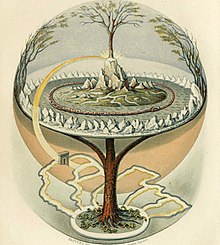The underworld, also known as the netherworld or hell, is the supernatural world of the dead in various religious traditions and myths, located below the world of the living.[1] Chthonic is the technical adjective for things of the underworld.



The concept of an underworld is found in almost every civilization and "may be as old as humanity itself".[2] Common features of underworld myths are accounts of living people making journeys to the underworld, often for some heroic purpose. Other myths reinforce traditions that the entrance of souls to the underworld requires a proper observation of ceremony, such as the ancient Greek story of the recently dead Patroclus haunting Achilles until his body could be properly buried for this purpose.[3] People with high social status were dressed and equipped in order to better navigate the underworld.[4]
A number of mythologies incorporate the concept of the soul of the deceased making its own journey to the underworld, with the dead needing to be taken across a defining obstacle such as a lake or a river to reach this destination.[5] Imagery of such journeys can be found in both ancient and modern art. The descent to the underworld has been described as "the single most important myth for Modernist authors".[6]
By religion
editThis list includes underworlds in various religious traditions, with links to corresponding articles:
Underworld figures
editThis list includes rulers or guardians of the underworld in various religious traditions, with links to corresponding articles.
See also
edit- Afterlife
- Yomi
- Barzakh
- Hell, a similar infernal realm
- Hollow Earth
- Otherworld
- Pure land
- World Tree, a tree that connects the heavens, the earth and the underworld in a number of spiritual belief systems
References
edit- ^ "Underworld". The free dictionary. Retrieved 1 July 2010.
- ^ Isabelle Loring Wallace, Jennie Hirsh, Contemporary Art and Classical Myth (2011), p. 295.
- ^ Radcliffe G. Edmonds, III, Myths of the Underworld Journey: Plato, Aristophanes, and the 'Orphic' Gold Tablets (2004), p. 9.
- ^ Jon Mills, Underworlds: Philosophies of the Unconscious from Psychoanalysis to Metaphysics (2014), p. 1.
- ^ Evans Lansing Smith, The Descent to the Underworld in Literature, Painting, and Film, 1895–1950 (2001), p. 257.
- ^ Evans Lansing Smith, The Descent to the Underworld in Literature, Painting, and Film, 1895–1950 (2001), p. 7.
- ^ T. Williams, J. Calvert, Fiji and the Fijians, Heylin, 1858.
External links
edit- Media related to Underworld at Wikimedia Commons